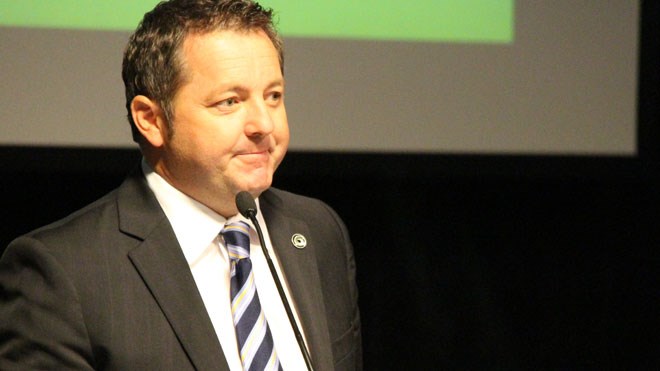What the study found was Canada's 100 highest paid CEOs made an average of $9.2 million in 2013, about 25 per cent more than the $7.35 million they made in 2008, while the average Canadian salary that year was $47,358, about 12 per cent more than the 2008 level.
And while public sector CEOs were the focus of the study, during the recent strike by nurses at nine of Ontario's 14 Community Care Access Centres (CCAC), the Ontario Nurses' Association singled out North East CCAC CEO Richard Joly for his six-figure salary.
Why, the union asked, should Joly have received a pay increase totalling 64 per cent between 2008 and 2013 while the average registered nurse with the CCAC got just four per cent over a similar period? The average salary for a CCAC nurse is around $50,000 a year.
As a public sector worker, Joly's salary is public information. Reviewing the yearly Sunshine List of public sector workers making more than $100,000 a year between 2008 and 2013, NorthernLife.ca learned that — averaged out — Joly received a nearly 13-per-cent raise every year over those five years. In dollars, he made $122,210 more in 2013 than he did in 2008.
During that five-year period, Joly's position was renamed from executive director to CEO, after Ontario's CCAC boundaries were re-written and he became responsible for a much larger area of the province. His salary was also frozen at $248,000 in 2010 and 2011.
Osmo Ramakko, vice-chair of the North East CCAC's board of directors, defended the board's decision to increase Joly's salary by so much, saying the salary is now in line with what other CCAC CEOs are paid.
This is true. Joly is the fourth highest paid CCAC head in Ontario. Gilles Lanteigne, CEO of the Champlain CCAC, had the highest yearly wage in 2013 at $314,991. Tuija Puiras, CEO of the North West CCAC, was paid $204,691 in 2013, placing her 12th on the list.
“No (executive director) is paid exactly the same as the other 14,” Ramakko said.
It's also in line with the salaries those of other high-level executives in health care. Health Sciences North CEO Denis Roy, for instance, earned $349,125 in 2013, while Louise Paquette, CEO of the North East Local Health Integration Network earned $250,000 that year.
Whether Joly was deserving of the increases, the optics of the CEO receiving double-digit salary increases while front-line workers received a fraction struck a chord with the nurses' union, who said it was unfair for Joly to receive such increases while their members had to fight to receive substantially less.
Ramakko said the board of directors determines the CEO's salary by factoring experience, the size of the organization, the executive's level of responsibilities and comparisons to other CEOs in the health-care field.
As for Joly's 64-per-cent wage increase over five years, Ramakko said it was reflective of his increased responsibilities in that time.
“The organization has been assigned a number of new initiatives and new responsibilities,” he said.
Those include a larger staff and services like rapid response nursing and telehomecare, which were not offered in 2008.
According to Joly's 2014 contract with the North East CCAC, his salary that year was $243,880, which includes performance-based compensation (PBC). To receive the PBC – which would equal up to $48,776 or 20 per cent of his salary – Joly needs to meet pre-determined goals established under the Performance Management Plan. If he doesn't meet the targets, his salary falls to around $195,000.
“To be clear, the 20 (per cent) Pay for Performance is not a bonus,” said North East CCAC board chair Ron Farrell in a written response to NorthernLife.ca. “In order for Mr. Joly to receive his full compensation each year, he must meet the specific targets and goals of the Board as outlined in the Performance Management Plan.”
The board of directors determines the performance pay goals, which reflect strategic priorities for that particular year.
“These can include meeting financial targets, reducing wait times for specific patient populations or developing a new program to meet patient needs (i.e. Telehomecare),” Farrell said.
Ramakko added the North East CCAC board sees no relevance between Joly's salary and the two-week labour dispute with the Ontario Nurses' Association.
The dispute between the nurses' association and nine CCACs across the province – primarily over the nurses' wages – has gone before a third-party arbitrator.
Join Sudbury.com+
- Messages
- Post a Listing
- Your Listings
- Your Profile
- Your Subscriptions
- Your Likes
- Your Business
- Support Local News
- Payment History
Sudbury.com+ members
Already a +member?
Not a +member?
Sign up for a Sudbury.com+ account for instant access to upcoming contests, local offers, auctions and so much more.
